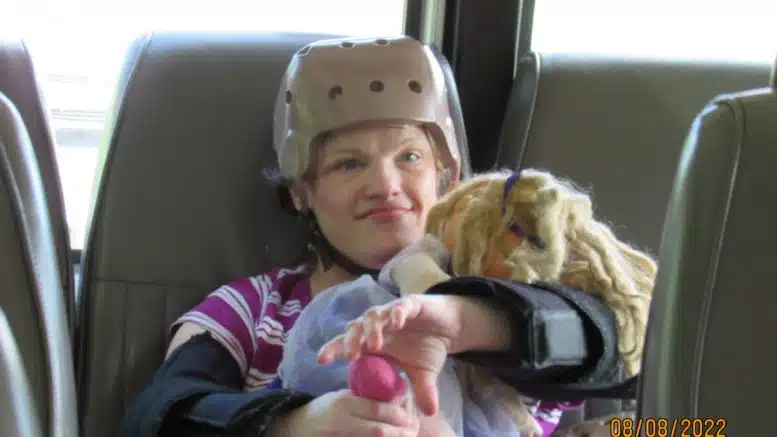By Anne Blythe
In the seven months since a judge issued an extensive order in a long-running North Carolina disability rights lawsuit, a creeping sense of trepidation has persisted in some families whose members with intellectual and developmental disabilities live in long-term care facilities.
Disability Rights North Carolina, the organization that brought the suit against the state Department of Health and Human Services, went to the courts six years ago in an attempt to push the state to provide more community and home-based services for such individuals.
Superior Court Judge Allen Baddour issued a ruling in November 2022 that many disability rights advocates described as “historic,” because he ordered the state to provide services to people with intellectual and developmental disabilities in the home settings that they choose. In an attempt to provide those people with meaningful choices within the next six years, the order ends new admissions into long-term or intermediate residential care facilities by 2028.
But some of the details and timelines meant to force better care have caused backlash from the very people they were meant to help.
Lisa Grafstein, an attorney with Disability Rights and a Raleigh Democrat elected last year to the state Senate, said in a recent interview with NC Health News that she and others knew that provisions in the order were likely to cause consternation among families of the affected.
The organization tried to work with state administrators to come up with a change to the order that would be palatable to both sides.
That didn’t happen.
So on May 30, Disability Rights went back to the court with a request for Judge Baddour: Modify his November order to remove 2028 as the date for ending new admissions to private intermediate care facilities.
The state has appealed Baddour’s 2022 ruling. While the case makes its way through the appellate courts, the judge put a halt on its implementation.
Disability Rights “decided to seek the judge’s permission to remove this concern for the community so we can all work together to develop the best ways to provide quality residential services to individuals” with intellectual and developmental disabilities, according to a May 30 post on the organization’s web site.
The organization has been seeking and receiving feedback from family members, guardians and providers, the post continues.
“We must all be able to work together,” the post states. “We are stronger together. ”
Singling out one group
Fallout from the Samantha R v North Carolina, et al case has created divisions in the disability community that surfaced earlier this year in the General Assembly, when lawmakers from both parties sponsored a bill “to require the protection and advocacy agency for North Carolina to report its actions regarding its impact on persons with disabilities,”
Though House Bill 361 does not mention Disability Rights North Carolina by name, it clearly targets the organization. The House approved the proposal in early April. It is parked now in the Senate rules committee, which has a big say in which bills will get a full vote in that chamber.
The proposed legislation would require Disability Rights to submit reports on its advocacy work to the chairs of the House and Senate Appropriations Committees on Health and Human Services during legislative sessions and to legislative oversight committees when lawmakers are not usually in Raleigh.
Rep. Donna White, (R-Clayton) a registered nurse, who was one of the lead sponsors of the proposed legislation acknowledged in April that it was being put before lawmakers because of the lawsuit’s impact on some of the caregivers.
If Baddour’s order were to be upheld, DHHS Sec. Kody Kinsley said in February, at least 1,000 individuals could be pushed out of small, privately run, community-based homes and other stable environments on which their families rely.
The motion filed by Disability Rights on May 30 would ensure that wouldn’t happen if Baddour signs onto it.
An olive branch, of sorts
Frank Moyer, a physician, has a 28-year-old daughter who is blind, non-verbal and mobility-impaired who has been in an intermediate care facility for four years now.
Moyer said in a phone interview on Thursday that he had just visited his daughter and “she is thriving.” In the facility where she lives, she can engage in activities and get the social feedback she enjoys. There are baseball games, therapeutic horseback riding, “joy proms,” events for people of all ages with special needs.
“It’s as much a community as one could ever imagine,” Moyer said.
The Samantha R case was filed on behalf of Samantha Rhoney, whose parents went to court after they were rejected for services they needed to be able to keep their daughter at home.
In 2015, the Rhoneys felt compelled to place their daughter in the J. Iverson Riddle Developmental Center in Morganton, which turned into a multi-year stay.
The Rhoneys have been able to get more favorable community services for their daughter over the past year. Nonetheless, their plight highlights problems that many families face when they cannot get the services they need to keep people with intellectual and developmental disabilities closer to home, in their communities.
Disability Rights sees in its work “every day that there is no real choice for thousands of people if safe and reliable community-based services aren’t readily available statewide – that is the reason we filed the Samantha R lawsuit,” Grafstein said.
“During the litigation, we asked for a date to hold DHHS’ feet to the fire. The intent was to ensure a real deadline instead of just a generalized goal for getting the necessary community-based services in place,” Grafstein added.
For too long, Grafstein said, the state has agreed with Disability Rights in theory about the need for genuine community-based choices. Despite that, she added, many of those people who wanted and needed such services have been compelled to rely on state facilities because care closer to home is not available.
After Baddour issued his order last year, and backlash came from some families who like the long-term and intermediate care facilities their loved ones are in, Disability Rights tried to come up with a compromise.
“The intent was not to put quality residential providers out of business or have anyone forced out of their home,” Grafstein said. “In fact, the order specifically says that is not required or intended. ”
Nonetheless, Disability Rights’ leaders realize there’s fear among families that halting new admissions after 2028 would cause some facilities to close.
For instance, Moyer said he felt the order could end up being “life threatening” to his daughter.
Sign up for our Newsletter
“*” indicates required fields
Disability Right’s intent has been “securing genuine choice, not to cause anyone to lose a placement that they want to keep,” Grafstein said. “[W]e did not and do not think that wide–spread closure is required by the order, but we also don’t want people to live in fear. ”
A father’s concerns
Moyer, who has spoken out against the 2028 deadline, says he holds no ill-will toward Disability Rights, and in fact thinks “they do good work in many, many ways.”
He describes the motion to amend the judge’s order as an olive branch of sorts.
“I’m hoping it’s as good news as it sounds,” Moyer said.
Still, a bit of skepticism crept in as he asked: “Does that mean they don’t want this to happen in 2028, but they’ll come back and want it to happen in 2030?”
Telling a residential care facility that it cannot have new admissions after a certain point is like telling a hotel it can still be a hotel but it can’t have any new guests check in, Moyer argued.
“They say. ‘We’re not forcing you to close,’” Moyer said. “They absolutely are forcing them to close and they’re double-talking their way out of it.”
Moyer said it would behoove all parties and stakeholders to have more conversations with each other and try to see all sides of a complicated issue.
Creeping progress
In 1999 U.S. Supreme Court issued the landmark Olmstead decision, which found that uncalled for segregation of people with disabilities without opportunities for work or play in their communities was unlawful discrimination. Since then, the state has developed some long-term plans to ensure that doesn’t happen.
Disability Rights argued in the Samantha R case that while there indeed had been planning to allow for more community engagement, it had not happened quickly enough, the details were not specific enough and timelines were not concrete.
DHHS has argued that some of those details are contingent upon state funding and there hasn’t been enough certainty on what funds will be available for the long-haul.
DHHS is aware of the May 30 motion and is reviewing it with counsel, a spokesperson for the department said in an email to NC Health News.
In the meantime, DHHS will continue to get “input from individuals with disabilities, family members, providers and multiple community stakeholders,” according to the email. “We will continue to work in good faith with all parties and listen to feedback from a broad set of stakeholders to strengthen North Carolina’s ability to provide choice to individuals with [intellectual and developmental disabilities].”









